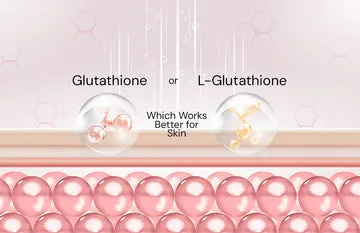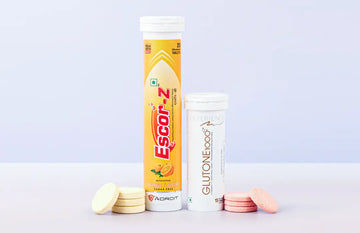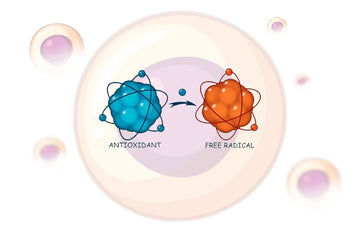Not all glutathione is created equal.
If you’ve ever compared skincare supplements and noticed both “Glutathione” and “L-Glutathione” listed on labels, you’re not imagining things — there is a difference. And that small “L” in front can make a big impact on how effectively your body absorbs and uses it.
In fact, L-Glutathione is considered the premium, active form that delivers visible skin and wellness benefits. But what makes it more effective? And how does it stand apart from regular glutathione?
Let’s decode the science and find out which one truly helps your skin glow from within.
What Is Glutathione?
Glutathione is a naturally occurring antioxidant produced in your liver and present in every cell of the body.
Composed of three amino acids — cysteine, glycine, and glutamic acid — it’s often referred to as the master antioxidant because it protects cells from oxidative stress and damage caused by free radicals.
It plays a vital role in detoxification, immunity, and skin tone regulation, helping maintain a clear, healthy complexion.
However, factors like ageing, pollution, and stress reduce your body’s natural glutathione reserves — making supplementation a smart way to restore balance.
Read Also:- What are Benefits of Glutathione
What Is L-Glutathione?
L-Glutathione is the reduced, bioactive form of glutathione — the exact structure your body recognises and uses.
This is the version responsible for neutralizing free radicals and supporting detox at the cellular level.
While the term “glutathione” is often used broadly, not all supplements contain this active “L” form, which directly impacts absorption and efficacy.
Simply put, L-Glutathione = ready-to-use antioxidant power, while generic or oxidized forms first need to be converted in the body before offering benefits.
Glutathione vs L-Glutathione: The Key Differences
|
Parameter |
Glutathione |
L-Glutathione (Reduced Form) |
|
Structure |
Can include both active and oxidized forms |
Reduced, active form readily absorbed |
|
Bioavailability |
Moderate |
High – directly utilized by cells |
|
Stability |
May degrade during digestion |
Clinically stable and bio-fermented |
|
Skin Impact |
General antioxidant support |
Proven to brighten and even skin tone |
|
Scientific Validation |
Limited data |
Backed by clinical studies for skin and detox |
|
Example |
Generic glutathione tablets |
Glutone 1000 with Setria® L-Glutathione (Japan) |
Why L-Glutathione Is Premium for Skin Health
L-Glutathione has been extensively studied for its ability to:
-
Reduce melanin synthesis, resulting in visibly brighter, even-toned skin.
-
Combat oxidative stress that leads to dullness and premature aging.
-
Detoxify the body, supporting clearer, healthier skin from within.
-
Enhance the effect of Vitamin C and E, amplifying your antioxidant defense.
That’s why Glutone 1000 is formulated with Setria® L-Glutathione — a 99.5% pure, Japan-sourced, bio-fermented ingredient known for superior absorption and clinical efficacy. It’s more than a supplement; it’s antioxidant science designed for visible glow.
Glutathione or L-Glutathione for Skin Brightening & Glow
When it comes to brightening and skin health, L-Glutathione consistently outperforms generic glutathione. Regular use helps:
-
Fade pigmentation and dark spots
-
Improve skin clarity and radiance
-
Support collagen and elasticity
-
Protect against pollution and UV damage
How to use: Take one Glutone 1000 tablet daily on an empty stomach, ideally paired with Vitamin C (Escor-Z) for enhanced antioxidant synergy.
Conclusion
So, glutathione or L-glutathione — which is better?
The answer is clear: L-Glutathione is the body-ready form that delivers real, visible results.
If you’re investing in a glutathione tablet for glow and overall wellness, look for one that specifies the L-form, like Glutone 1000, powered by clinically validated Setria® L-Glutathione.
Because when it comes to skin health, the right form makes all the difference — and the glow you get from within is the one that truly lasts.







 Mon to Sat - 10 am to 7 pm
Mon to Sat - 10 am to 7 pm